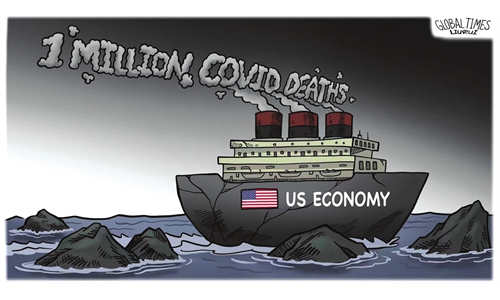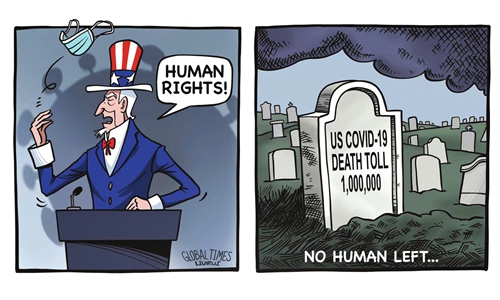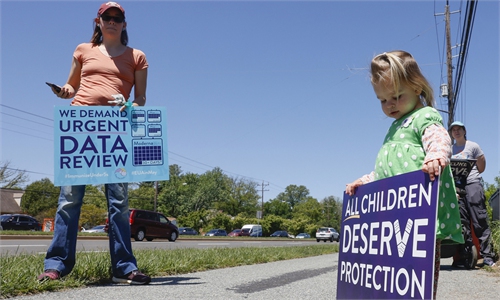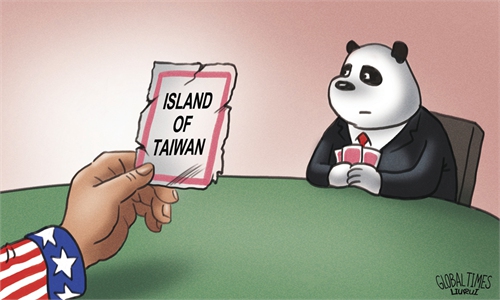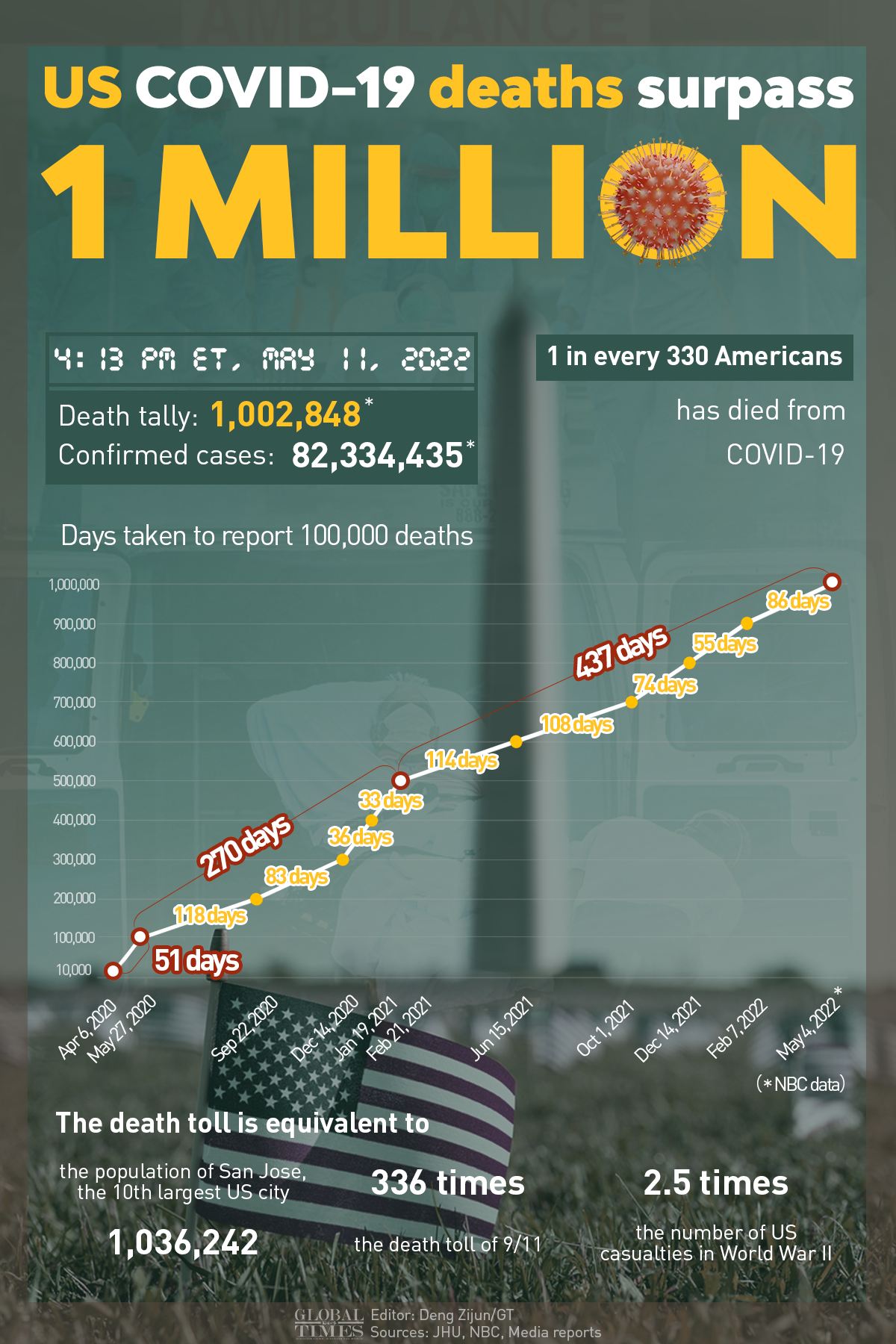
US COVID-19 deaths surpass 1 million Graphic: Deng Zijun/GT
Ironically, on the day when the US reached what President Joe Biden calls "a tragic milestone" of one million coronavirus deaths, the president appealed for a renewed international commitment to fight COVID-19 by convening the second global COVID-19 summit, a move Chinese analysts said would only serve as a political show to shore up the country's leadership and was an absurd attempt to "save face" for his failure to fulfill the promise of "healing the US."
The Biden administration said the US could potentially see 100 million COVID-19 infections this fall and winter. The president has called on Congress to provide more funding for testing, vaccines and treatments, but Congress refused to meet his request to provide another $22.5 billion in what he has called critically needed aid funding.
However, the House passed legislation Tuesday night that it would provide $40 billion in new aid to Ukraine.
The lack of funding is believed to be a reflection of faltering resolve at home that jeopardizes the global response to the pandemic. Eight months after Biden used the first such summit to announce an ambitious pledge to donate 1.2 billion vaccine doses to the world, will the US, a country mocked for governing by "lip service," fail the world again as it did in the first summit?
Chinese observers pointed out that the global COVID-19 summit has nothing to do with combating the virus, but is merely political manipulation aimed at dividing the world - inviting the authority on the island of Taiwan to the summit being a vivid example. They urged the Biden administration to abandon its concept of governing the country with political shows as it will help neither the US nor the world.
Empty promise
Ahead of the summit, Biden called on upper-middle and high-income countries to donate $2 billion in coronavirus treatments and $1 billion in oxygen supply to poorer countries, according to CNN. The president also called on world leaders to collectively commit to vaccinating 70 percent of the world's population against COVID-19 within a year.
In remarks opening the summit, Biden urged Congress to approve more funding for his administration's COVID-19 efforts, saying the world is "at a new stage in fighting this pandemic, facing an evolving set of challenges."
Since the outbreak of the epidemic, the so-called vaccine aid commitment made by the US has repeatedly disappointed the world. It was only in June 2021 that the country, under repeated urging from the international community, unveiled its Vaccine Global Distribution Plan, pledging to donate 80 million doses of vaccine to the world by the end of June. However, the process of getting the donations to those who need them has been tortuously slow.
The donations also often came with many political conditions. For example, media reports said the US government had planned to provide 2.5 million doses of the vaccine to Mexico in exchange for tighter controls on illegal immigration along its border with Guatemala. The US was also mocked by the international community by announcing it was donating 80 doses of vaccines to the Caribbean nation of Trinidad and Tobago, which has a population of 1.4 million. The country also reportedly raised the price of vaccines in its supply contract with the European Union.
Lü Xiang, a research fellow at the Chinese Academy of Social Sciences, told the Global Times that the summit has been used by the US to divide the world along ideological lines, and to shore up its global leadership to cover up its bungling of how it handled outbreak within the US.
Analysts noted that inviting the island of Taiwan shows the nature of its political manipulation as it is a blatant interference in China's internal affairs and also shows that the ultimate goal of the US in holding this summit is to take advantage of the epidemic to confuse countries, and fool them to follow the US to engage in competition against China.
The US' laissez-faire attitude toward the pandemic also wreaked havoc on its economy, which goes against its wish that the easing of COVID-19 restrictions will lead to an economic bounce-back. Despite such a high death toll, the US economy has yet to return to the fast track, and has bungled both COVID-19 control and economic development.
Jin Jiyong, a professor from Department of International Relations and Public Affairs at Shanghai International Studies University, said, "It is not a matter of reaching any consensus, but of boasting its presence in public health to the international community, similar to the so-called Summit for Democracy, which was held in December last year."
During the first summit, Biden called on the world to donate more vaccines, provide treatment and detection support and increase domestic vaccine production. But these goals are far from being accomplished.
According to the Associated Press, the US has shipped nearly 540 million vaccine doses to more than 110 countries and territories. But after delivery, the problem is no longer that there aren't enough shots, but a lack of logistical support to get doses into arms.
According to government data, more than 680 million donated vaccine doses have been left unused in developing countries because they were about to expire and could not be administered quickly enough. As of March, 32 poorer countries had used fewer than half of the COVID-19 vaccines given to them.
Real actions urged
At the start of the pandemic, in late March 2020, former US president Donald Trump held a White House briefing at which his top advisors presented their official COVID-19 death projections: between 100,000 and 240,000 Americans would die from the disease if Americans followed reasonable social-distancing and other mitigation guidelines. Two years later, Americans all know how that worked out.
According to CNBC report, more than half of US COVID deaths have occurred since Biden was inaugurated in January 2021.
To hold a global summit under such circumstances will do nothing but make more countries realize that the US is losing ground in its fight against the epidemic. Biden originally hoped that the summit would highlight the leadership of the US in the global response to the epidemic, but the American death tolls are clearly a slap in the face, and will only make more countries see the failure of the US in the anti-COVID fight, Chinese observers said.
Some US public health experts commented on the absence of China from the summit, saying it was regrettable as China could contribute more. In response, Chinese analysts said China has always been active in all efforts that help the international community unite and fight the virus in a scientific way. But it is regrettable that the summit is not the right platform to do this.
Analysts urged the US to take real actions in many fields, such as providing more funding and assistance to COVAX to promote access to COVID-19 vaccines.
"The US has done a good job in vaccine promotion, but it is still strongly driven by politics. The country's vaccine diplomacy focuses on America, especially in South America and Latin America, leaving a large vaccine gap in Africa. If the US is willing to sacrifice profits to promote the accessibility of vaccines to the world, it would be a great thing. It is not a problem of technology, but a political balance," Jin said.
"To better promote vaccine equity, we need to ensure that countries receive a steady and predictable flow of vaccines to effectively plan vaccination campaigns, and that doses end up in arms and we need to ensure lower-income countries are protected against both supply and demand side risks," José Manuel Barroso, Chairman of the Gavi Board - the Vaccine Alliance which is co-leading the COVAX Facility, told the Global Times.
"Vaccine nationalism, export controls and supply bottlenecks are the problems need to be conquered. Given the capacity of lower-income countries to absorb large volumes of vaccines, what we need from donors is not necessarily more donations, but better-quality ones. This means large volumes up front, with plenty of notice and long shelf lives," Barroso noted.
According to a statement released by the White House after the summit, Biden and European Commission President von der Leyen agreed to ensure ongoing deliveries of vaccines are based on country demand, informed by best practices and reach 'tarmac to arms', with focus on sub-Saharan Africa.
Through support from Team Europe and US Global VAX programs, both sides recognize that vaccine equity starts with best practice donation principles including adequate and transparent planning in cooperation with governments, in-country partners, COVAX, Africa Vaccine Acquisition Task Team, World Health Organization , the COVID- 19 Vaccine Delivery Partnership, and others.
